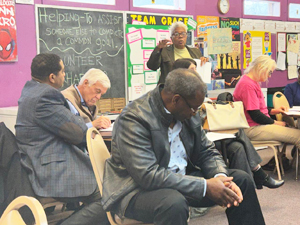 By Fletcher Word
By Fletcher Word
The Truth Editor
As she starts the process of drafting legislation for an urban farm bill, State Senator Paula Hicks-Hudson brought together dozens of interested parties on Friday, January 13 to solicit input on the content of such legislation.
The gathering, at Grace Community Center, featured a robust conversation and the input Hicks-Hudson sought from community activists, college representatives, government entities and, above all, experienced urban farmers who are familiar with the very topics Hicks-Hudson hopes to address in her bill.
There are many possible benefits to sustaining and expanding urban farms, noted Hicks-Hudson. “We can have access to healthy food, it can be an economic development driver because we’re talking about farming, it can be used to support the neighborhood [such as at the Grace Community Center] and it’s a funding source for the Center.”
In attendance were Sean Nestor, founder of the Urban Agriculture Alliance of Lucas County; Thomas Jackson, renowned local urban farmer; Sonia Ramelle of SONIA Organics and Urban Wholistics; Jason Gfeller, urban farmer, among others knowledgeable on the topic.
Also joining the discussion was Congresswoman Marcy Kaptur, who has long expressed an interest in the subject. Kaptur wrapped up the meeting not only by adding to the subject but also by recommending ways to achieve the goals outlined.
“I’ve been talking about urban farming even before I was in the mayor’s office,” said Hicks-Hudson at the outset of the meeting. “I will introduce legislation based on our discussions here. Urban agriculture is alive and well.”
Hicks-Hudson’s objective was to create legislation that will enable urban farming, not only in Toledo but also around the state, to gain traction and become as vital a part of the local and state’s economy as is rural farming. She drew a distinction between urban farming and community gardens, noting the breadth and long-range possibilities of the former.
“We have the opportunity to create something my colleagues in Columbus don’t think is real,” said Hicks-Hudson. “They think in terms of community gardens. I have to educate my colleagues about how important this is.”
The state government leaders and legislators are not the only movers and shakers whose attention needs to be redirected, observed Hicks-Hudson and many of the meeting’s participants. The United States Department of Agriculture has been woefully neglectful of directing its resources to urban areas.
The benefits of urban agriculture were repeatedly extolled by the attendees – fresh food more easily accessible to city residents, healthier communities, a business venture that can economically benefit the communities, remediation of vacant properties and, noted Sonia Ramelle, such farms are “violence interrupters.”
There are also challenges to farming in urban areas, according to attendees. Above all, remediating the land and ridding it of the contaminants from the previously occupied buildings is no small task. Buildings are rarely totally removed and contaminants can remain in the soil indefinitely.
Aside from the soil issues, other challenges include zoning restrictions, building codes, lack of education in the community about the benefits of gardens, composting within city limits and acquiring properties that are not adjacent to the farmers’ residential properties.
Congresswoman Kaptur summed up the meeting with her perspectives on urban farms.
“I’m trying to get people here to earn money on food and become wealthier,” she said. “The USDA only thinks ‘rural’ and most technical assistance is locked in rural areas. There is a real problem in that department which floats down to the state – here in Ohio most of [the USDA staff] is in Columbus. [Paula Hicks-Hudson] is the only elected official I have ever known who cares about this.”
Kaptur also pointed the group towards a number of directions to secure help in those efforts to earn money on food such as how to reach certain departments of the USDA, how to investigate the “special designation that some urban areas, such as Cleveland, have earned and reaching out to HBCUs which have received grants “to get them focused on urban agriculture.”
“I do believe we are sitting in the garden and you are the pioneers,” she said of the meeting’s attendees.
Hicks-Hudson anticipates introducing her urban farm legislation within 60 days.
